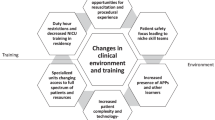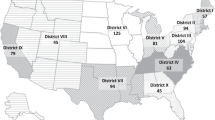Abstract
Due to the changing complex healthcare environment, educational innovation is essential to meet the needs of current and future neonatal-perinatal medicine (NPM) leaders. Greater clinical demands, decreased academic funding, and expanded graduate medical education program requirements have negatively impacted time for teaching and educational scholarship potentially limiting innovation in the field. By focusing on adult learning principles, embracing technology, and promoting collaboration, today’s educators are preparing the next generation of neonatologists. Current innovations include regionalizing simulation boot camps, leveraging virtual learning to increase accessibility, developing niche training opportunities, and incorporating population health principles within existing quality initiatives. Areas in need of additional innovation include faculty and fellow development for teaching skills, expansion of educational networks, and dissemination and financial support of educational scholarship. These efforts and future innovations will require medical institutions and national NPM organizations to further invest in the medical educator as part of their missions.
This is a preview of subscription content, access via your institution
Access options
Subscribe to this journal
Receive 12 print issues and online access
$259.00 per year
only $21.58 per issue
Buy this article
- Purchase on Springer Link
- Instant access to full article PDF
Prices may be subject to local taxes which are calculated during checkout

Similar content being viewed by others
References
DaRosa DA, Skeff K, Friedland JA, Coburn M, Cox S, Pollart S, et al. Barriers to effective teaching. Acad Med. 2011;86:453–9.
ACGME. Program Requirements For Graduate Medical Education In Neonatal-Perinatal Medicine. 2020. https://www.acgme.org/Portals/0/PFAssets/ProgramRequirements/329_NeonatalPerinatalMedicine_2020.pdf?ver=2020-06-29-162707-410.
Cruess RL, Cruess SR, Steinert Y. Medicine as a community of practice: implications for medical education. Acad Med. 2018;93:185–91.
Kumar D, Vachharajani AJ, Wertheimer F, Vergales B, Glass K, Dannaway D, et al. Boot camps in neonatal-perinatal medicine fellowship programs: a national survey. J Neonatal Perinat Med. 2019;12:231–7.
Sawyer T, French H, Soghier L, Barry J, Johnston L, Anderson J, et al. Educational perspectives: boot camps for neonatal-perinatal medicine fellows. NeoReviews 2014;15:e46–e55.
Sawyer T, Stavroudis TA, Ades A, Dadiz R, Dammann CEL, Halamek LP, et al. Simulation in neonatal-perinatal medicine fellowship programs. Am J Perinatol. 2020;37:1258–63.
Boss RD, Hutton N, Donohue PK, Arnold RM. Neonatologist training to guide family decision making for critically ill infants. Arch Pediatr Adolesc Med. 2009;163:783–8.
Parham D, Reed D, Olicker A, Parrill F, Sharma J, Brunkorst J, et al. Families as educators: a family-centered approach to teaching communication skills to neonatology fellows. J Perinatol. 2019;39:1392–8.
Varkey P, Karlapudi S, Rose S, Nelson R, Warner M. A systems approach for implementing practice-based learning and improvement and systems-based practice in graduate medical education. Acad Med. 2009;84:335–9.
Backes CH, Reber KM, Trittmann JK, Huang H, Tomblin J, Moorehead PA, et al. Fellows as teachers: a model to enhance pediatric resident education. Med Educ Online. 2011;16:7205.
Miloslavsky EM, Boyer D, Winn AS, Stafford DE, McSparron JI. Fellows as teachers: raising the educational bar. Ann Am Thorac Soc. 2016;13:465–8.
French H, Gray M, Gillam-Krakauer M, Bonachea EM, Carbajal M, Payne A, et al. Flipping the classroom: a national pilot curriculum for physiology in neonatal-perinatal medicine. J Perinatol. 2018;38:1420–7.
French H, Arias-Shah A, Gisondo C, Gray MM. Perspectives: the flipped classroom in graduate medical education. NeoReviews 2020;21:e150–e156.
Miller LE, Stoller JZ, Fraga MV. Point-of-care ultrasound in the neonatal ICU. Curr Opin Pediatr. 2020;32:216–27.
Nguyen J, Amirnovin R, Ramanathan R, Noori S. The state of point-of-care ultrasonography use and training in neonatal-perinatal medicine and pediatric critical care medicine fellowship programs. J Perinatol. 2016;36:972–6.
Singh Y, Tissot C, Fraga MV, Yousef N, Cortes RG, Lopez J, et al. International evidence-based guidelines on Point of Care Ultrasound (POCUS) for critically ill neonates and children issued by the POCUS Working Group of the European Society of Paediatric and Neonatal Intensive Care (ESPNIC). Crit Care. 2020;24:65.
Berwick DM, Nolan TW, Whittington J. The triple aim: care, health, and cost. Health Aff. 2008;27:759–69.
Byrne LM, Nasca TJ. Population health and graduate medical education: updates to the ACGME’s common program requirements. J Graduate Med Educ. 2019;11:357–61.
Moriates C, Arora VM. Achieving alignment in graduate medical education to train the next generation of healthcare professionals to improve healthcare delivery. Healthcare. 2018;6:242–4.
Mahan JD, Clinchot D. Why medical education is being (inexorably) re-imagined and re-designed. Curr Probl Pediatr Adolesc Health Care. 2014;44:137–40.
Sigurdson K, Morton C, Mitchell B, Profit J. Disparities in NICU quality of care: a qualitative study of family and clinician accounts. J Perinatol. 2018;38:600–7.
Institute for Healthcare Improvement. Improving Health and Health Care Worldwide. 2020. http://www.ihi.org/education/Pages/default.aspx.
Ho T, Zupancic JAF, Pursley DM, Dukhovny D. Improving value in neonatal intensive care. Clin Perinatol. 2017;44:617–25.
Celenza JF, Zayack D, Buus-Frank ME, Horbar JD. Family involvement in quality improvement: from bedside advocate to system advisor. Clin Perinatol. 2017;44:553–66.
Jones T, Cohn F, Shapiro J. Minding the gap(s): narrativity and liminality in medical student writing. Lit Med. 2012;30:103–23.
Bodenheimer T, Sinsky C. From triple to quadruple aim: care of the patient requires care of the provider. Ann Fam Med. 2014;12:573–6.
Sikka R, Morath JM, Leape L. The Quadruple Aim: care, health, cost and meaning in work. BMJ Qual Saf. 2015;24:608–10.
International Network for Simulation-based Pediatric Innovation, Research, and Education (INSPIRE). 2020. http://inspiresim.com/what-is-inspire/.
Schwartz A, King B, Mink R, Hicks PJ. The emergence and spread of practice-based medical education research networks. Acad Med. 2020;95:S12–s13.
American Academy of Pediatrics SoN-PM. 2019 Call for District Grants. 2019. https://services.aap.org/en/community/aap-sections/sonpm/district-grants/.
Author information
Authors and Affiliations
Consortia
Contributions
BS conceptualized, drafted, reviewed, and revised the paper, and provided oversight for all phases of manuscript preparation. JE, MG, DO, MCS, KS and AP conceptualized, drafted, reviewed, and revised the paper. HF, KL, JW, SK, and KR critically reviewed the paper. Consortium authors conceptualized the paper.
Corresponding author
Ethics declarations
Competing interests
All authors have a leadership position within their respective neonatal-perinatal medicine fellowship training program. There are no competing interests.
Additional information
Publisher’s note Springer Nature remains neutral with regard to jurisdictional claims in published maps and institutional affiliations.
Rights and permissions
About this article
Cite this article
Schwarz, B., Enciso, J., Gray, M. et al. Essentials of neonatal-perinatal medicine fellowship: innovations in medical education. J Perinatol 42, 677–682 (2022). https://doi.org/10.1038/s41372-021-01126-2
Received:
Revised:
Accepted:
Published:
Issue Date:
DOI: https://doi.org/10.1038/s41372-021-01126-2



